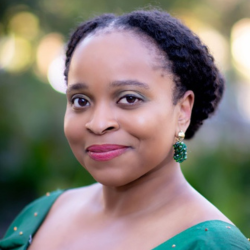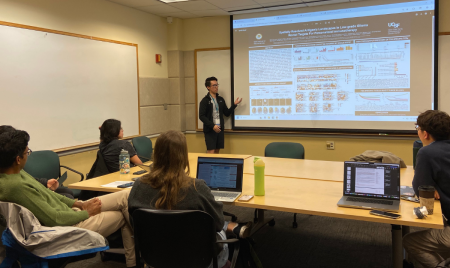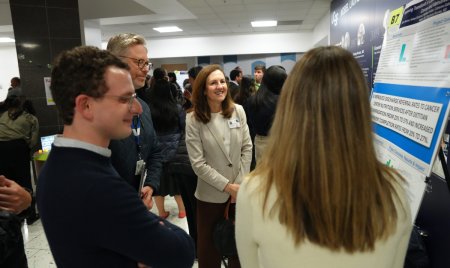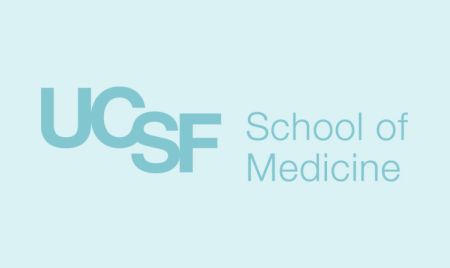An Interview with Lucy Ogbu-Nwobodo, MD, MS, MAS, UCSF School of Medicine Post Baccalaureate Program Director

Lucy Ogbu-Nwobodo, MD, MS, MAS, Assistant Professor of Psychiatry, grew up in the East Bay after emigrating from Nigeria at age 11 and became acutely cognizant of the disparities in health and opportunity in under-resourced communities. This awareness fueled her passion for medicine and a lifelong commitment to social justice. As the UCSF Post Baccalaureate Program (PBP) director, she is honored to lead a program that empowers aspiring physicians from similar backgrounds and cultivates the next generation of medical leaders committed to transforming health care in the communities that need it most.
What is the UCSF Post Baccalaureate Program, and how is it unique?
It’s a one-year graduate certificate program that provides upper-level science courses, seminars, and mentoring to prepare low-income college graduates for academic success in medical school. It has a uniquely interdisciplinary focus. We engage students in activities within the UCSF School of Medicine and the schools of Dentistry and Pharmacy. Students also participate in a continuous quality improvement project in a UCSF hospital or clinic, which is essential for helping them identify the patient populations they want to serve.
How have your personal experiences fueled your leadership vision?
I experienced poverty in West Africa and East Oakland and fully understand what it means to be young and have ambition without access to resources. I realized early on that the most significant health issue in many of these communities was poverty. I understood that injustice can result from being poor or not having access to medical care, and I saw how that can impact a community. This experience deeply inspired me to pursue medicine as an avenue for social justice.
After graduating from Cal State East Bay, I worked at Highland Hospital in Oakland, reinforcing my commitment to serving those most in need. I saw firsthand the stark disparities in health care access – how people with no insurance or limited resources received care far too late, often when their conditions had become far more severe. I enrolled in the UC Davis Post Baccalaureate Program to help me get into medical school. It was the launching pad that changed my life, and I’m honored now to have the opportunity to lead the UCSF program and create avenues for students from similar backgrounds to follow that path. This role is personal for me. I’ve lived their journey and fought the uphill battles these young people face; I know how much this opportunity means to them, their families, and their communities.
Many talented students from under-resourced communities face barriers to medical school preparation. How does the Post Baccalaureate Program bridge the gaps and help them overcome these challenges?
First-generation students, especially those from low-income and underserved backgrounds, face significant challenges in preparing for medical school. Many lack access to resources like private tutors, test prep courses, and mentorship afforded by their medical school counterparts. This initiative addresses these gaps and levels the playing field, allowing students from under-resourced and first-generation backgrounds – who have the intelligence and drive but not the financial means – to focus on their studies and receive the preparation they need to succeed in medical school. The PBP allows them to realize their aspirations and creates a much-needed, diverse medical workforce.
You’ve said diversity in health care leads to better outcomes for everyone. Can you explain why this is important and how the Post Baccalaureate Program supports this vision?
The evidence is clear: When doctors and patients come from similar backgrounds, we see fundamental differences in health outcomes, particularly in communities of color. That’s where our program comes in. When our students become doctors, they choose to practice in California’s most underserved areas, where they’re not just treating patients but also transforming communities. These doctors are passionate about living and working there, they understand their patients’ needs, and they’re committed to creating long-term change.
This pathway to medical school has been around for 25 years and has an impressive track record. What makes it so successful?
In 25 years, we’ve helped 325 students launch their journeys to medical school, with 94% of them matriculating into a medical school, and many attending UC medical schools, including UCSF. Our program is particularly successful because a shared purpose drives our students. They are motivated by personal ambition and a deep commitment to lift their families and communities. Their collective mission and mutual support fuels their success, and it’s why our program continues to thrive. There is no shortage of talented, motivated people who want to become doctors to help their communities prosper. What they need is a path forward.
You are passionate about addressing disparities in health care. How can this opportunity make a difference in California?
In California, more than 11 million people lack adequate access to primary care physicians. Our program cultivates doctors who already have deep roots in these communities – doctors who want to live and work there and are committed to making change happen. We’ve seen it work for decades.
Can you share an example of how this initiative changes lives and transforms communities?
Dr. Violeta Barroso truly embodies the program’s full-circle model, having journeyed from being the daughter of immigrant farmworkers in the Central Valley to becoming a dedicated family physician serving the same community. She experienced the challenges of limited health care access and the cultural barriers to pursuing medicine and leveraged the UCSF Post Baccalaureate Program’s comprehensive support system to overcome these obstacles. Now, Dr. Barroso brings this unique perspective to her medical practice in Watsonville, California, where her intimate understanding of agricultural workers’ health risks enables her to provide culturally attuned care to her community. Dr. Barroso’s commitment extends beyond individual patient care, as she actively works to create pathways for other underserved students in the region to enter medicine, often referring them to our program. Her efforts address immediate community health needs and the broader imperative of building a more diverse physician workforce.









